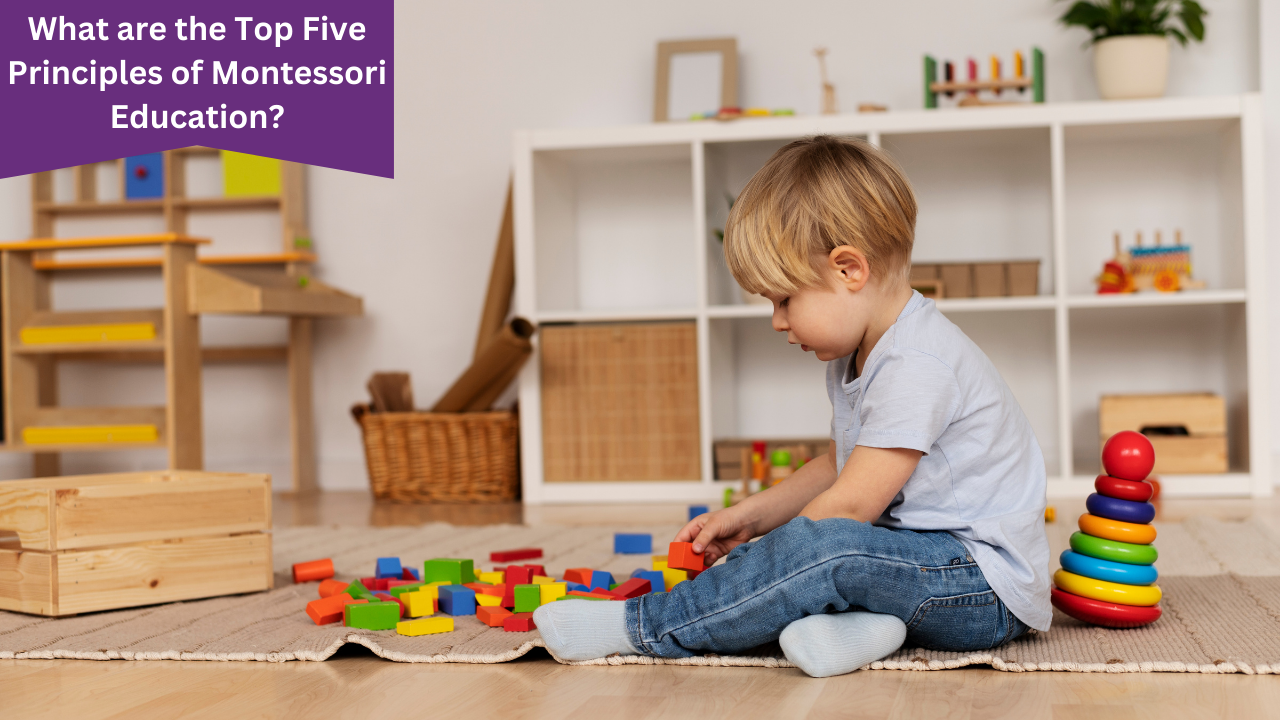Unlocking Potential: The Top 5 Principles of Montessori Education
The Montessori method, developed by Italian physician and educator Dr. Maria Montessori over a century ago, isn’t just a teaching style; it’s a philosophy of education grounded in a deep understanding of child development. While seemingly subtle, the core principles guiding Montessori classrooms are powerful catalysts for fostering independent, confident, and engaged learners. Let’s delve into the top five principles that form the bedrock of this renowned educational approach:
- The Prepared Environment: The classroom itself is a teacher in the Montessori system. It’s not just a room filled with desks; it’s a carefully designed environment tailored to foster exploration and learning. This “prepared environment” is characterized by:
- Child-Sized Furniture: Everything from tables and chairs to shelves and tools are scaled down to fit the children, encouraging independence and self-reliance.
- Accessible Materials: Learning materials are systematically arranged on low shelves, making them readily available for children to choose and explore. This promotes self-directed learning and reduces reliance on adults.
- Order and Beauty: The classroom is aesthetically pleasing, clean, and organized. This order creates a sense of calm and focus, allowing children to navigate the space with ease and purpose.
- Real-Life Tools: Children are presented with real, practical tools appropriate for their size and abilities. This allows them to engage in hands-on activities that build practical life skills.
The prepared environment acts as a silent guide, inviting children to explore and learn at their own pace.
- The Absorbent Mind: Montessori believed that children possess an “absorbent mind” from birth to around age six. During this period, they unconsciously absorb information from their surroundings, shaping their understanding of the world. This principle highlights:
- Early Learning is Powerful: The experiences and environments children encounter in their early years are foundational to their development.
- Rich and Stimulating Environment: The prepared environment is crucial for providing the rich and stimulating experiences essential for this absorbent mind.
- Sensory Exploration: Montessori materials are designed to engage the senses, allowing children to absorb knowledge through sight, touch, sound, and movement.
- Importance of Observation: Educators are trained to observe children and provide them with appropriate materials and experiences based on their individual needs and development.
By understanding the absorbent mind, Montessori education recognizes the critical importance of early childhood experiences.
- The Sensitive Periods: Montessori identified specific “sensitive periods” in a child’s development, during which they are particularly receptive to learning certain skills or concepts. These periods are like windows of opportunity for optimal growth, and capitalizing on them is key in Montessori education. Key sensitive periods include:
- Order (approx. age 1-3): Children have a strong desire for routine and predictability.
- Language (approx. age birth-6): Children absorb language with remarkable ease.
- Movement (approx. age birth-5): Children are driven to explore and refine their motor skills.
- Sensory Exploration (approx. age birth-6): Children explore the world largely through their senses.
- Social Behavior (approx. age 2.5-6): Children are driven to learn social skills.
By understanding these sensitive periods, educators can provide the appropriate learning materials and activities at the right time, maximizing the child’s learning potential. This allows for a truly individualized approach to learning.
- Self-Directed Learning & Independence: A cornerstone of Montessori is fostering independence and self-directed learning. Children are not simply passive recipients of information; they actively participate in their own education. This principle manifests in:
- Choice: Children have the freedom to choose their own activities within a structured framework. This fosters intrinsic motivation and a love of learning.
- Hands-on Work: Rather than relying on textbooks and lectures, children learn through hands-on manipulation of materials.
- Self-Correcting Materials: Many Montessori materials are designed to allow children to self-correct their work. This promotes autonomy and builds confidence.
- The Role of the Guide (Teacher): The teacher is not a lecturer, but a facilitator and guide, observing children and offering support as needed.
By allowing children to choose their work and learn through active engagement, Montessori education fosters a love of learning that extends far beyond the classroom.
- Respect for the Child:At the heart of the Montessori philosophy lies a deep respect for each child as an individual. This principle emphasizes:
- Individual Pace: Recognizing that children develop at different rates, the Montessori method allows for a flexible learning pace that is tailored to each child’s needs.
- Observation: Respect is demonstrated through careful observation of each child, taking note of their individual strengths, interests, and challenges.
- Freedom Within Limits: Children are given freedom to explore and learn within a structured and supportive environment.
- Promoting Confidence: By fostering independence and allowing children to succeed at their own pace, the Montessori method helps build confidence and self-esteem.
This respect translates to a learning environment where each child feels valued, understood, and empowered to reach their full potential.
Conclusion
The Montessori method is more than just an educational system; it’s a philosophy that honors the innate potential within every child. By focusing on the prepared environment, the absorbent mind, sensitive periods, self-directed learning, and respect for the child, Montessori education creates an environment where children can thrive, grow, and develop into confident, engaged, and lifelong learners. These five principles provide a framework for understanding the unique power of the Montessori approach, and why it continues to resonate with educators and parents around the world.
Enquire now: https://www.growinnsteps.com/preschool/
